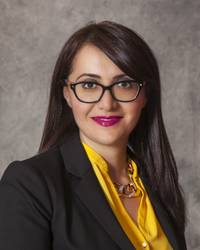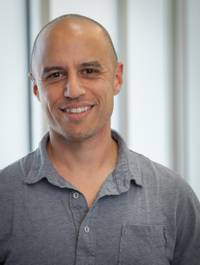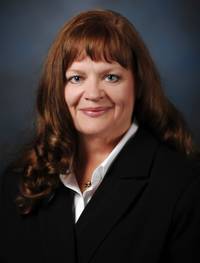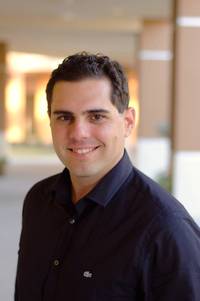The sixth annual Las Vegas Top Tech Exec Awards, a collaboration between Cox Business and VEGAS INC, recognizes Southern Nevadans who are helping shape the future before our very eyes. These are people who are often on call 24-7, asked to solve problems that may never have happened in a rapidly evolving industry.
-
LIFETIME ACHIEVEMENT AWARD
Camille McCue, Ph.D., Director of Technology Innovations Adelson Education Campus
With childhood activities that included tinkering with her Apple II+ computer, competing in weekend math contests and conducting science-fair research, Camille McCue developed an early affinity for STEM (science, technology, engineering, mathematics), parlaying that passion into a successful career in tech and education.
With a résumé that includes IBM, NASA and Vegas PBS, McCue — who also authors technology titles for “CliffNotes” and “…for Dummies” brands — was recruited by the Adelson Education Campus to develop and implement its game-changing Technology Innovations and Integration Initiative, coming on board in August 2015 and elevating the K-12 school into the premier STEM learning institution on the West Coast.
“We had initial funding of $1 million from Steven Mack (the Adelsons contributed another $3 million), who wanted to do something groundbreaking in technology,” said McCue, who holds a B.A. in math from the University of Texas at Austin, an M.A. in curriculum and instruction from the University of Texas at San Antonio and a Ph.D. in curriculum and instruction from UNLV. “I was brought in to lead the innovation initiative and direct the development of our new 5,000-square-foot STEM workshop and entrepreneurial facility, called the Startup Incubator.”
But first things first.
She said it was initially imperative to implement a one-to-world connectivity paradigm, where students and teachers — there are about 100 instructors and 550 children at Adelson — have mobile devices. The second step was ensuring everyone knew how to properly use them.
Then came the centerpiece of the initiative, the Startup Incubator, an inventor’s workspace.
“The space provides a location and tools and mentors and curriculum so students can take an idea in their head to products and businesses for the real world,” said McCue, adding that the Startup Incubator has three main areas, a coding lab, a digital media studio and a FabLab. “It means fabrication lab, but it’s also fabulous, because we can make actual products.”
While 6th and 9th graders are required to complete a mandatory one-semester Startup Incubator course, it is also offered as an elective.
“It’s really popular, and more than half of the upper school is enrolled in an Incubator class,” McCue said.
— Danielle Birkin
-
COMMUNITY EXEMPLARY AWARD
Shavonnah Tièra Collins, Managing Director, RedFlint Experience Center
A Las Vegas native and Frogger aficionado who learned basic coding using a computer-keyboard-and-cartridge system that plugged into the television — it was purchased from the Sears catalogue — Shavonnah Tièra Collins has always had an interest in technology.
“But I didn’t know it was an actual career path until I took a web development class at UNLV after graduating from the University of Miami School of Business with a double major in business management and business law,” said Collins, who organized and facilitated Startup Weekend Las Vegas, served as an instructor and program coordinator/startup advisor at UNLV and founded Urban Innovators before joining the RedFlint Experience Center about six months ago.
RedFlint, sparked by the University of Phoenix, opened Oct. 15 and provides startups, established companies and entrepreneurs with hands-on, real-life access to new concepts, programs and technology. The first such facility in Southern Nevada, the 10,000-square-foot RedFlint center is located in the Bank of America Plaza downtown and serves to close the skills gap whereby rapid technological advances have caused professionals, who are otherwise fully qualified within their fields, find themselves falling behind.
University of Phoenix is partnering with Iron Yard Ventures — which has spurred investment in 59 startups in the last four years — to provide access to a premier business accelerator through RedFlint.
In her role as managing director, Collins manages the center’s day-to-day operations to educate, incubate and accelerate participants through interactive services and experiences.
“RedFlint is my dream job,” said Collins, adding that the education component was a critical area missing from the local technology community. “The second piece is incubation, where you have an idea and don’t know where to start. Our workshops help them solidify their ideas in the marketplace. From there, the Iron Yard Ventures accelerator is open to all companies and founders.”
A collaboration with the University of Phoenix’s College of Information Systems & Technology and School of Business, along with Iron Yard, RedFlint is positioned to ignite change within many industries. About 50 percent of the companies participating in the accelerator are expected to be locally based.
“For us, RedFlint is about getting people engaged and exposing them to new technologies, and the response has been phenomenal,” Collins said. “There’s so much potential in Southern Nevada when it comes to technology and entrepreneurship, and RedFlint is a great resource.”
— Danielle Birkin
-
GOVERNMENT
Jason Frame, Manager of Information Technology, Southern Nevada Health District
Over the past year, when the Southern Nevada Health District was moving and consolidating locations, Jason Frame worked on moving departments and consolidating the data center — changes that have increased efficiency while lowering costs.
Together with his team, Frame also has developed several new apps for the Southern Nevada Health District. Most notably, he managed development for an app that lets the public view current and past grades and violations of any restaurant in the Las Vegas area.
He also directed the purchase and implementation of a network infrastructure in the new SNHD Decatur building that includes more than 45 Cisco switches, new internet routers, new firewalls and more than 30 wireless access points.
Frame who built the software engineering team from the ground up, starting with selling the idea up the leadership chain and following through by creating a new supervisory position to run a custom development team using both industry standards and cutting-edge.
“We had a very productive year,” Frame said, “moving our corporate headquarters and modernizing much of our infrastructure, while at the same time creating many apps for the public to access various forms of our services.” He is proud of what he termed the “complete refresh of our physical infrastructure. As part of moving our corporate headquarters and combining two locations into a single location, we modernized our network and server infrastructure, often replacing hardware that was 10 to 12 years old.”
Frame and his colleagues moved roughly 380 employees into the old Target store at 280 Decatur Blvd., near 95 & Decatur. “Our new hardware has allowed us to improve our network speeds by over 1,000 percent, and doing so actually lowered our monthly service costs because of the new hardware.”
During the move, he also added additional services for the public, such as making it easier for Las Vegans to register for and order their birth and death certificates using a kiosk-based app.
“We are continuing this modernization to allow us to offer more services to the public electronically so they can do business with the Health District on their schedule, and from a location that is more convenient for them,” he said.
For 2017, Frame is planning on completing the modernizations projects that are currently underway, then shifting focus to two main areas: improving customer services and disaster preparedness.
— Howard Riell
-
PUBLIC BUSINESS
Randy Dearborn, Vice President of Multimedia & Guest Technology, MGM Resorts International
Randy Dearborn has been running digital signage networks since 1993, starting with a skunkworks set-up at Treasure Island and building it up to a network that covers thousands of screens across the MGM Resorts International portfolio.
As the person who oversees all the digital signage programs for the MGM properties, he is responsible for more than 62,000 digital devices/displays in Las Vegas alone from 11 properties on the Strip. “The display count alone is over 60,000,” Dearborn said, “which includes marquees, end caps, video walls, way fingers, readerboards, twitter and Instagram walls, table denomination, menu boards — I could go on and on.”
Dearborn said his greatest accomplishment of 2016 was “finally beginning to leverage this massive digital network that we have been building for the past several years. For example, we built the largest DOCSIS III network anywhere in the hospitality industry. This has allowed us to convert our legacy analog coax cable plants into a full blown digital network.”
The initial advantage, he said, was not having to spend tens of millions of dollars at each property to pull Cat 6 or fiber to every guest room, “and we have over 40,000 guest rooms on the Las Vegas Strip alone.
“The DOCSIS network allows us to stream all digital traffic to the guest room such as Wi-Fi, IPTV, door locks, mini bars, ‘Do not disturb’ signs, tray tracking, and housekeeping requests along with other devices.”
During the months ahead, Dearborn and his colleagues plan to “unleash a gamut of incredible opportunities that we now have full control over.” Their major challenge will likely be fully automating the system into existing APIs for F&B, retail, entertainment and more. “This will take some time, but will be well worth the time and effort,” he said. “One other challenge will be changing the operational mindset which allows data to determine what is exposed to our customer, along with syncing the different business with best practices.”
He urged colleagues to “be prepared — change is coming, and its coming fast. It’s funny: being in the gaming industry we’re comfortable with taking on risk, but betting on which new technology is going to stick is not good odds. With that said the one common factor in most technology is they all need increasingly larger bandwidth, so the safest bet is to build a great foundation that can take advantage of whatever comes down the pipe.”
— Howard Riell
-
NONPROFIT
Armena Mnatsakanyan, Executive Director, Lutheran Social Services of Nevada
It all started with a “crazy idea” when Armena Mnatsakanyan, executive director of Lutheran Social Services of Nevada, began brainstorming about how to increase efficiencies at the organization’s food pantry.
“Our pantry is supermarket-style, and I really liked the system, but we had clients lining up at 2 or 3 in the morning waiting for us to open at 8 a.m., and it was really hard for me to watch, especially for clients who are seniors or had children,” said Mnatsakanyan, who has been working in nonprofit management for 23 years. “I had a simple dream about virtualization, and in this age of online shopping, I wondered why a nonprofit couldn’t have a progressive, digitalized system.”
Mnatsakanyan’s research resulted in the October 2016 debut of DigiMart, an online food pantry system that is the first of its kind for a Nevada nonprofit. Here’s how it works:
Clients are assigned a user name and password, and using a LSSN kiosk — or a computer or smartphone if they have access to such devices — they log onto a food database that displays pictures of available items. A click of the mouse puts selected items into the digital shopping cart.
When the order is complete, staff or volunteers bag the food and have it ready for clients to pick up.
Client are assigned points that are used like money to “purchase” food, and items that have a higher nutritional value “cost” less than items that are not as salubrious. For example, a can of reduced-sodium chicken noodle soup may be just two points, while a can with a higher salt content might be five points. Fresh items always carry a value of one.
“It’s just that easy,” said Mnatsakanyan, adding that the DigiMart system is based on software developed and licensed by Nexus Financial Services in New York City for St. John’s Bread & Life, a social services agency in Brooklyn, which has operated a digital food pantry since 2008.
“Instead of reinventing the wheel, we called St. John’s program manager, and are so grateful to St. John’s for helping to get DigiMart off the ground,” she said.
LSSN received grant funding from the U.S. Department of Agriculture, USAA Savings Bank and the Federal Home Loan Bank of San Francisco.
“We’re the first agency on the West Coast to do this, and I think DigiMart will prove to be a pilot prototype project,” she said.
— Danielle Birkin
-
PRIVATE BUSINESS
Clifton Cole, Virtual Design and Construction Manager, The Penta Building Group
In just 16 years, the Penta Building Group has grown into a nationally recognized contractor with more than 180 salaried employees. The company was founded on the premise that people come first, which results in the completion of high-quality projects, strong relationships with clients, partners, subcontractors, employees and the Las Vegas community, a safety rating below the national average, and zero instances of owner litigation while providing more than $4 billion in construction and pre-construction services — including over $380 million in revenue in 2015.
This kind of growth and success would not have been possible if the contractor had not learned to harness the power of technology. Cliff Cole was not only the catalyst for Penta’s technological revolution, but also the reason Penta remains at the forefront of the industry.
In 2008, Cole implemented Building Information Modeling (BIM), a process of designing buildings in the virtual space using one coherent system of models rather than separate drawings. He developed a BIM strategy and coordinated software with other trade partners on the project. Penta then created a new position for Cliff, BIM Manager, responsible for implementing BIM and technology companywide.
Cole is proud of the technical advancements that his company has achieved over the last few years. “As one of the larger general contractors in Southern Nevada, Penta has been on the forefront of pushing numerous technology initiatives. I have lead the efforts for several technology initiatives that have pushed the boundaries for innovation and productivity. Also, I was instrumental in creating our first internal Penta technology committee that is responsible for creating, defining and shaping technology for the entire company.”
Cole pointed with pride to this year’s quadrupling the size of Penta’s Virtual Design and Construction Department and increasing the virtual 3-D capabilities. “These increased capabilities have allowed us to be successful at winning more work, decreasing construction schedules and improving construction productivity.”
His current focus for 2017 will be to improve field mobility (technology on the go) and collaboration (integrating people and data) in the company. “This focus will improve efficiency in two areas that are critical to the success of the company. The major challenge will be to figure out how to get team members to trust in new technology and processes. Developing standardization of processes and implementing training will help to minimize this challenge.”
— Howard Riell
-
HEALTH CARE
Dr. Zubin Damania, CEO, Turntable Health
As CEO of innovative downtown primary-care clinic Turntable Health, Zubin Damania is revolutionizing the traditional fee-for-service and medicine-as-business models of health care.
Under the pseudonym ZDoggMD, Damania has created a series of music videos, parodies and comedy sketches — think “Weird Al” Yankovic meets Mayo Clinic — using humor to both entertain and educate medical professionals and the general public about the dysfunctional U.S. health care industry. An internet sensation with more than 150 titles and more than 90 million views on Facebook and YouTube, Damania started making videos as a cry for help.
“It was also a way to satirize our broken system so I could effect change,” said Damania, who was working as an internal medicine hospitalist at Stanford University Medical Center at the time, having received an undergraduate degree at the University of California, Berkeley, where he studied molecular biology and music; obtaining his M.D. from the University of California, San Francisco; and completing his residency at Stanford University.
Damania is helping to change the system in his role at Turntable Health, which has the motto “Primary Care, Remixed.” He was recruited in 2102 as CEO of the clinic by Zappos CEO Tony Hsieh as part of the Hsieh’s Downtown Project, a $350 million revitalization effort to transform the neighborhood into the epicenter of the burgeoning local technology, arts, culinary and business scene. Hsieh tasked Damania with nothing less than rethinking how the goliath health care industry might look if it were done correctly from scratch.
“The old fee-for-service model, which I call Health 1.0, meant the more things you did to a patient, the more you got paid, and this was usually based on taking care of sick people rather than preventing disease,” Damania said. “Health 2.0 is medicine as business, with doctors sitting at a computer checking boxes. Our proposal centers around Health 3.0, which re-personalizes the sacred doctor-patient relationship from 1.0, and uses the technology and process improvements from 2.0 to focus on the unique patient and their needs.”
Offering affordable health care to all, Turntable charges a flat monthly rate of $80, and just $60 for children younger than 18. It also offers discounts for families and long-term membership plans, and anyone in the local culinary union qualifies for free coverage.
— Danielle Birkin
-
HOTEL | GAMING
Mary Lynn Palenik, Vice President, Caesars Technology Services Office of Strategy and Planning, Caesars Entertainment
Mary Lynn Palenik knows the importance of her role both within IT and in her company as a whole, and understands that one of her most important functions is sharing her knowledge and experience.
When she joined Caesars in 2015, her review of the organization identified gaps operationally and functionally, and in her team’s cohesiveness. Through her organizational redesign, she streamlined things across her department and encouraged teamwork.
Palenik worked hard this past year on developing a cohesive and high-performing team. Other accomplishments have included the introduction of a new framework, functional redesign, and the implementation of a governance model to establish a foundation for operational excellence.
“These initiatives are inexorably linked to the positive results that have been realized in a period of just over 12 months,” she said. “Since my joining the company in 2015, project success has increased at a multiple of over three times. These favorable results were achieved through discipline, project rigor, controls and accountability. Collectively, these are my greatest accomplishments of 2016.”
In 2017, continuing with the theme of change, Palenik will lead the Caesars Technology Services Office of Strategy and Planning and direct additional transformation and modernization efforts. “We will invest in new and innovative technologies and platforms,” she said, “establish relationships with leading technology partners and drive the discipline of accountability across the IT spectrum. I will continue to identify opportunities to embrace continuous process improvement and synergies that support cost efficiencies and operating effectiveness, and will look to provide business partners with seamless and exciting new business technologies.”
The advice Palenik has for her peers is the same advice that she would give to any professional. “Keep current and invest in yourself. Learning should never stop, and furthering your education through seeking and obtaining additional degrees or certifications is always important, and always beneficial.”
She also recommended that they stay connected with other professionals. “Become a mentor to others, write articles for industry publications and trade journals, and accept opportunities to speak on behalf of your profession and your company. Lastly, remember to share your talents and stretch yourself through service on one of the many worthwhile nonprofit organizations in our community.”
— Howard Riell
-
EDUCATION
Daniel Chapnick, Regional Hiring Manager, iD Tech
As regional hiring manager for iD Tech — a summer technology program founded in 1999 — Daniel Chapnick is helping to inspire the next generation of programmers, video game designers, app developers, engineers, filmmakers, photographers and innovators.
“At iD Tech, we take the fun summer-camp model and put a technology spin on it,” said Chapnick, who has a degree in electronic media from California State University, Long Beach, and joined iD Tech as a summer instructor in 2013, and now works full-time for the company, managing the Las Vegas, San Diego and Irvine programs.
A week-long day program for kids ages 7 to 17 — with overnight options available for kids older than 10 — iD Tech was originally founded in a garage in the Silicon Valley, and has since expanded to more than 140 locations across the U.S. The workshops are typically held on college campuses, with the local program based at UNLV.
“In Las Vegas, we average about 56 campers per week, with the cost starting at $849,” said Chapnick. “Each class has a student-to-instructor ratio of eight to one, so it’s a really personalized experience in a laid-back, no-pressure environment.”
As regional hiring manager, Chapnick works with local liaisons to coordinate the summer logistics and works with the IT departments to ensure computer compatibility. He also conducts outreach at local schools, and is exploring the idea of after-school programs and demos. He has built relationships with Clark County School District, FIRST Robotics, Skybot and other educational institutions in order to collaborate and promote the camp as well as highlight these partners. Chapnick is also responsible for recruiting and hiring summer staff.
“We love hiring college students, especially from UNLV for the local program, and find that computer science, engineering and graphic design majors work out really well,” he said. “At UNLV, we have a staff of eight, and it’s a paid position, so the college students get work experience, make some money and get to hone their own skills too.”
With a general mission to develop and deliver the highest quality technology experience and challenge kids to the next level, iD Tech summer camp, “lets their imaginations run wild, and anything related to the sandbox video game Minecraft is wildly popular.”
— Danielle Birkin
-
THE NOMINEES
Alan Woratschek, VHS system director – Information Services at Valley Health System
Albert Prendergast, information technology director and CIO at Las Vegas- Clark County Library
Brian Amira, vice president of information technology at Cashman Photo
Carlos Medina, director of digital engineering at Kr8 Media
Cesare Alessandrini, CEO and CMO of fileright.com
Claudia Perez, business development director at Equiinet, Inc.
Colin Sevier, director of information technology at Walker Furniture
Dan Mattox, director of information technology at Greenspun Media Group
Debbie Banko, CEO at Link Technologies
Elias Benjelloun, founder of Tech Start for Kids
Ernest Wilkerson, director of information technology at New Horizons Creation Church
Jeffrey D. Saffer, President and CEO of Quertle LLC
JJ Campbell, director of information technology at Intellatek
Julian Serrano, director of information technology at Goodwill Industries
Kimberly Miles, president at The Payroll Company
Kurt Hoff, director of information technology at UNLV-Thomas Mack
Mark Rouleau, owner of ITech Las Vegas
Mark Ruber, director of information technology at Las Vegas Paiute Tribe
Matt Lawyer, vice president of information technology at Marnell Gaming
Michael Mattox, chief technical officer at Victory Hill Exhibitions
Mohammad Ashrafi, founder and CEO at Dynamic Minds Consulting, Inc.
Nick Pocchia, director of information technology at Faraday Future
Ray Ragle, broadcast engineer and information technology specaialist at Desert Sands Braodcasting Inc.
Stacy Blattner, broker and general manager at Community Vision
Stanton Snow, facilities director of information technology at the YMCA
Susan Stone, director of information technology at Century Gaming
Susie Kisner, assistant director of information technology at Turntable Health
Michael Cox, director of information technologies at The Siegel Group
-
THE JUDGES
Laura Fucci joined the city of Henderson in November 2012 as chief information officer. She is the president of the Society for Information Management, Las Vegas, and was recognized in the Government category at the 2013 Top Tech Exec Awards.
Les Leonard is vice president of information technology of Resorts World Las Vegas. Leonard was recognized in the Gaming and Hospitality category at the 2015 Top Tech Exec Awards.
Lester Lewis is an IT strategist in the state of Nevada. Currently, Lewis is the deputy chief information officer for Clark County. Lewis was recognized in the Government category at the 2015 Top Tech Exec Awards.
Bob Schaich is senior vice president and chief information officer for the Nevada Market of UnitedHealth Group, a diversified health care services company. In 2015 he received the Lifetime Achievement Award from the Top Tech Exec Awards.
Manjit Gombra Singh is a member of the advisory board for college of engineering at UNLV and working on cybersecurity. Singh was honored in the Public Business category at the 2015 Top Tech Exec Awards.








